Human Rights
WHAT FUJITSU ASPIRES TO BE
We work unceasingly to create human-centric value in the real-world and digital societies in which we engage, and our corporate activities all reflect consideration for human dignity
GOALS FOR FY2025
Prevent and mitigate Human Rights risks throughout our value chain
- Conduct continuous Human Rights e-learning courses (maintain an attendance rate of 90% or more)
- Hold annual Stakeholder Dialogue sessions
- Work with our partners, customers and NGOs to establish activities that enable Human Rights, using Fujitsu’s expertise and technologies
Our Approach
Code of conduct
The shared values articulated in the Fujitsu Way’s Code of Conduct serve as guidelines for each employee to follow in their daily business operations. Prime among them is "We respect human rights," a principle that underpins all our corporate activities. By promoting management that respects human rights, we strive to embed this concept as an integral part of the day-to-day actions of all employees within the group.
Human Rights Statement
In 2014, the Fujitsu Group released the “Fujitsu Group Human Rights Statement” and revised it in 2022. It states that senior management is committed to upholding international norms on human rights, complying with laws and regulations, conducting ongoing human rights due diligence, and engaging in dialogue with stakeholders. It states that senior management is committed to upholding international norms on human rights, complying with laws and regulations, conducting ongoing human rights due diligence, and engaging in dialogue with stakeholders. We have notified our major suppliers of the revisions and request that they familiarize themselves with the revised Statement and comply with its content.
Fujitsu has publicly announced its support for the 10 principles of the United Nations Global Compact(*1) based on universal principles regarding human rights and rights at work, such as United Nations Guiding Principles on Business and Human Rights, the Universal Declaration of Human Rights and the International Labour Organization’s (ILO) Declaration on Fundamental Principles and Rights at Work. We have also made public announcements regarding the Modern Slavery Acts passed in the UK and Australia.
*1: Ten principles of the United Nations Global Compact:
The compact identifies 10 principles that corporations should uphold in four areas: human rights, labor practices, the environment and anti-corruption.
Organizational Structure and Regular Reviews
A Division dedicated to Human Rights has been established within the CEO Office, which reports directly to the President. This group promotes activities that address human rights issues across the value chain in collaboration with corporate and business divisions. The group has established a system of regular meetings with human rights personnel in each region to promote global initiatives.
Activities are reported to and discussed by the Sustainability Management Committee (chaired by the CEO), and the results are then shared with the Executive Management Council and the Board of Directors.
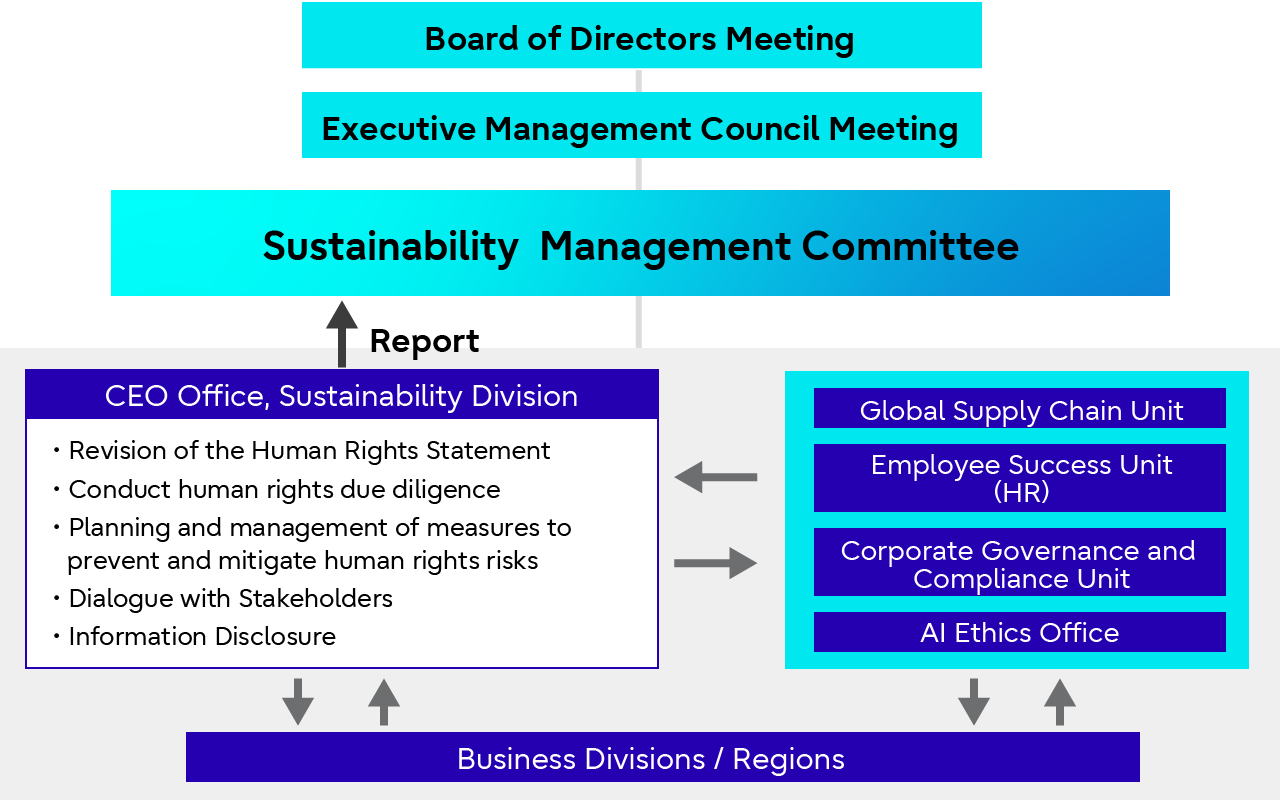
Conducting Human Rights Due Diligence
In accordance with the "Fujitsu Group Human Rights Statement," the Fujitsu Group is conducting “Human Rights Due Diligence.” We work continuously to identify human rights risks associated with our business activities, implement measures to prevent and mitigate negative impacts, and regularly monitor the progress of those measures to ensure their effectiveness. Information on the actions we take is disclosed in our Integrated Report and Sustainability Data Book.
When a new corporate acquisition is made, we carry out due diligence with respect to sustainability, including human rights. We also take steps to mitigate any risk of human rights violations and ensure that the Fujitsu Group human rights initiatives are fully embraced.
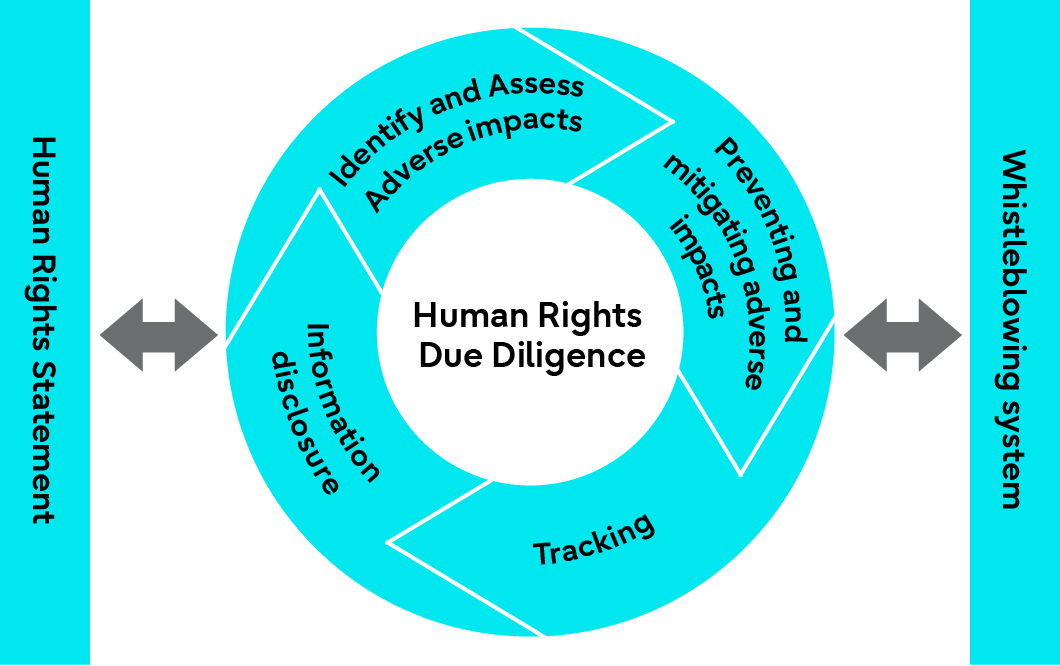
Assessment of Human Rights Impacts
To maximize the effectiveness of human rights due diligence in the Fujitsu Group, we conduct regular Human Rights Impact Assessments.
Working with Business for Social Responsibility (BSR), an international NPO, the main business activities of the Fujitsu Group were reviewed, and interviews were conducted with each region, corporate division and business division to compile a list of human rights risks. These issues were then prioritized in terms of severity, likelihood of occurrence, and relevance to the business. The most recent Human Rights Impact Assessment identified priority issues such as: “Employee working environment, health and safety,” “Forced labor and child labor in the supply chain,” and “Data privacy and information security in business.”
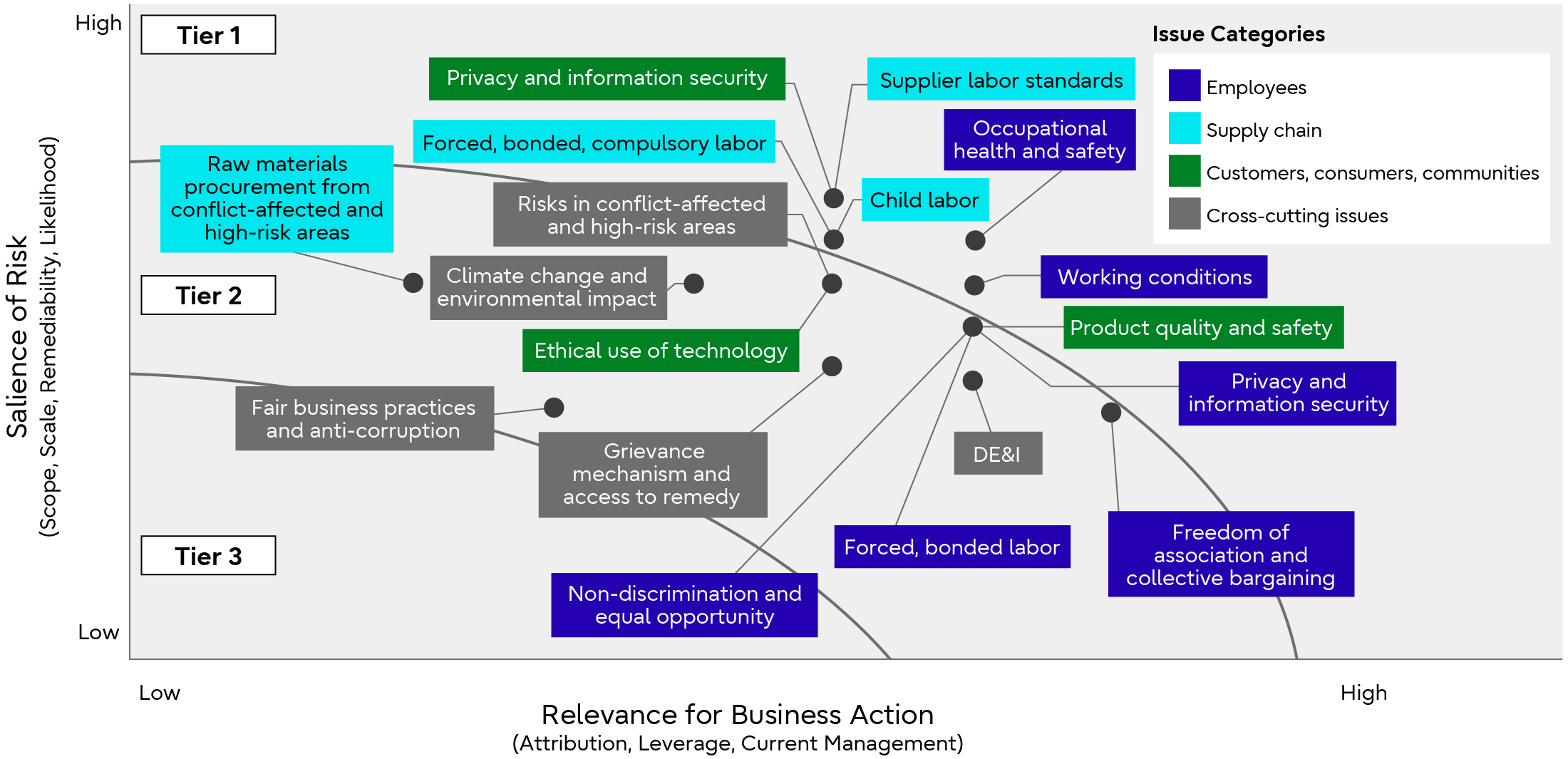
Initiatives to Prevent or Mitigate Negative Human Rights Impacts
Supply Chain
The Fujitsu Group requires that all its suppliers support the Fujitsu Group Human Rights Statement. The Group additionally requires them to support the prohibition of human trafficking, forced and child labor and discrimination, to support freedom of association and collective bargaining rights, and to promote policies such as pay equity.
Supply chain work environment
- Risks associated with services procurement for IT services: Risk of difficulty in achieving improvements in working conditions due to long work hours and lack of freedom of association for contractors to whom IT services are outsourced
- Risks associated with hardware procurement: Long working hours for migrant workers in global supply chains, underpayment of wages, inadequate occupational health and safety provision, restrictions on freedom of association, and limited job security
- To develop and announce the “Fujitsu Group Sustainable Procurement Policy,” and request that suppliers absorb and comply with said Policy
- To conduct a regular, annual CSR Survey of our major suppliers both in Japan and overseas to verify the status of initiatives
- Conducted a CSR Survey and received responses from 609 suppliers
Forced labor and child labor
- Forced labor risk for foreign workers in Japan’s Technical Intern Trainee Program: Risk of restriction on freedom of movement and on communication with the outside world, nonpayment of wages, long work hours, and debt bondage
- Child labor risk: Risk that young workers hired through apprenticeships and internship programs are working under abusive labor practices, including long hours, low wages, and inadequate health and safety practices
- The Fujitsu Group prohibits forced and child labor, and as part of the Fujitsu Group Sustainable Procurement Policy, requires suppliers to eliminate forced labor and child labor
- We confirmed the status of this initiative through a written survey
- Conducted a CSR Survey and received responses from 609 suppliers
- Confirmed that there is no forced labor or child labor
Dealing with high-risk minerals
- Risk of procuring raw materials (copper, cobalt, tin, tungsten, tantalum, gold, etc.) from conflict-affected or high-risk areas
- Risk of Fujitsu directly or indirectly supporting conflict and abuse perpetrated by non-state militia groups and private and public security forces as a result of procuring such raw materials
- Risks associated with human rights violations, including forced labor and child labor
- Fujitsu Group policy is to eliminate high-risk minerals that fuel conflict, or are associated with forced labor or human rights violations, from Fujitsu Group products, components, and supply chains. The Fujitsu Group conducts regular surveys of high-risk minerals
- Fujitsu received responses from 89.2% of the suppliers surveyed
- Smelters operated by 542 companies were checked, of which 274 were compliant with the RMI-certified Responsible Minerals Assurance Process (RMAP)
Employees
The Fujitsu Group takes the rights of all its employees very seriously and complies with the core labor standards set out by the ILO. It will not discriminate on the basis of race, skin color, religion, beliefs, sex, social status, family origin, disability, sexual orientation or gender identity, birthplace, age, or any other factor that is not related to legitimate business interests.
Work environment
- Risk of working long hours: The risk is higher for systems engineers and programmers whose work involves short deadlines, customer support, and sudden specification changes
- Risk of harassment
- Implement a range of initiatives to reduce long working hours and thus improve each employee's work-life balance and productivity
- Enhance systems to support diverse work styles by promoting Work Life Shift, which is based on teleworking and active use of flexible work arrangements such as flextime and the discretionary labor system
- Social Well-being
Non-discrimination and equal opportunity
- Risk of workplace discrimination on the basis of class, race, skin color, sex, language, religion, age, political or other opinions, national origin, property, sexual orientation, disability, birth or other status, etc, with respect to employment policies, training, promotions, hiring practices, wages, and social security
Human Rights Education and Awareness-Building
Education
Fujitsu will continue to provide comprehensive human rights education to all employees and will conduct human rights training that factors in the specific challenges faced by each region.
<e-Learning on Business and Human Rights>
- Purpose:To develop an understanding of how to conduct business in a way that respects human rights, and to learn the basics of recognizing and acting on the risks of human rights violations
- Target audience:All employees of the Fujitsu Global group of companies
- Attendance rate:96%(FY2024)
<e-Learning on AI Ethics>
- Purpose:To develop an understanding of global trends in AI ethics, Fujitsu’s initiatives in that space, and AI ethical risks in business
- Target audience:All employees of Fujitsu’s group companies within Japan
- Attendance rate:94%(FY2024)
<e-Learning on Workplace Management>
- Purpose:Learn the essential knowledge and mindset for workplace management to create a comfortable working environment (harassment prevention, mental health, labor time management, etc.).
- Target audience:Employees in leadership roles of Fujitsu Japan’s group companies
- Attendance rate:98%(FY2024)
Awareness-raising and webinars
Fujitsu and its group companies in Japan hold training and awareness-raising activities on various occasions. These include sessions for new hires, staff promotions (covering new hires, career hires, newly appointed executives, and directors), and management training for senior executives. We also organize events such as awards for human rights awareness slogans on Human Rights Day, along with webinars. We are a member of a voluntary organization called the Industrial Federation for Human Rights, Tokyo. We work together with the many member companies to promote mutual learning so that respect for human rights becomes an integral part of our corporate culture, and we engage in activities conducive to awareness-building from a corporate perspective.
To mark Human Rights Day, we held an internal, Group-wide globally ideation challenge on the theme of “Technology and Human Rights Issues.” The objective was to canvass innovative business ideas that leverage technology to solve human rights issues. Employees from diverse backgrounds around the world applied, providing a collection of creative, out-of-the-box business proposals relating to human rights.
Customers and End Users
Because the Fujitsu Group shoulders considerable responsibility as an IT developer and supplier, we devote a great deal of effort to deepening our understanding of the potential negative impacts of the many and diverse human rights issues entailed by advanced IT such as AI, and to minimizing those impacts. This applies to areas such as data security, privacy protection, and the ethical use of data.
Privacy and Data Security
- The risk that Fujitsu customers and end users of Fujitsu products and services will not obtain appropriate informed consent when collecting, using, sharing, or otherwise processing data, resulting in a negative impact on personal privacy and on the right to data protection
- The risk that personal privacy will be violated, endangering life and safety due to the use of products and services in a way not intended by the manufacturer or service provider
- The risk that the management and protection of the data and information of Fujitsu customers and end users of Fujitsu products and services may be exposed to external cyberattacks
- In FY2024, we provided information security education materials for our partners
- We implemented initiatives to safeguard and improve the security of customer information through our products and services
- Information security
Initiatives on AI Ethics
The rapid progress of AI , including generative AI and AI agents, is resulting in dramatic changes to people’s lives and the communities in which they live. While this innovative technology offers new solutions to social and environmental problems, it remains a “black box” process where people do not understand how its outcomes are achieved. Another issue is that the large volumes of data involved in that process can include inherent biases, which the technology encourages. Even when used with care, AI can lead to unforeseen consequences for people. There have been reports of ethical issues such as discrimination and unfairness arising from AI misidentification and consequent negative decision-making, which can erode trust in AI. Fujitsu therefore considers it an essential part of its responsibility as an AI researcher, developer, provider and operator to offer AI that is valuable, safe and secure to use.
The Fujitsu Group has long advocated a ‘human centric’ approach and argued that information technology should fundamentally be used to focus on, and to benefit, people. In March 2019, as a reflection of the rapid recent development of AI technologies, the Fujitsu Group formulated and announced the "Fujitsu Group AI Commitment". As one of the companies which carries out AI-related businesses including research, development, provision and operation activities, we aim to emphasize the importance of communication with a wide range of stakeholders in the community, including users and consumers, as we distribute the enormous value of AI to society. For that purpose, the commitment outlines our promises with customers and the community.
The Fujitsu Group has identified the ethical risks listed below arising from the use of AI, and is formulating mitigation measures to address emerging risks that could significantly impact our future business.
Emerging Risks
The Ethical Risks of Utilizing AI
As a company that has been researching, developing, providing, and operating AI technologies since before the 1980s, Fujitsu has long asserted that information technology must be used in a human-centric way. In recent years, there have been reports of shocking cases of ethical issues arising from the use of AI for handling privacy information. Examples include discrimination and unfairness which have occurred as a result of AI misidentification, leading to negative decision-making. Such cases can erode trust in AI. Fujitsu therefore considers it an essential part of its responsibility as an AI researcher, developer, provider and operator to offer AI that is valuable , safe and secure to use.
In recent years, the spread of generative AI and the emergence of AI agents has advanced AI to the point that AI is increasingly replacing human judgment across a broad range of domains. While the use of AI is expanding, there is an increasingly acute risk that the behaviors and inappropriate outputs from Fujitsu’s AI could infringe on the human rights of users and consumers, which could in turn pose risks not only of legal liability but also of damage to the Group’s reputation.
In addition, the EU AI Act of 2024 requires developers, users, and other stakeholders to take strict action based on the level of risk that their AI systems could pose to the enjoyment of human rights. Violations could result in penalties, including fines of up to 7% of total global sales. It is therefore crucial to implement appropriate risk management in the development and operation of AI systems. (As at June 2024)
Fujitsu has established a Group-wide system to assess AI ethical risks. The system has defined risk levels and requires that products and business projects that equal or exceed a certain level must pass through an AI review. The AI Ethics Office and professionals specializing in R&D, human rights and legal matters participate in the review, which evaluates the social impact of AI from multiple perspectives.
To enable all employees to promptly identify AI ethical risks, Fujitsu is implementing various Group-wide initiatives including avenues such as education and the provision of theme-based learning materials to deepen understanding of the importance and key aspects of AI ethics.
As a stratagem for mitigating quality risks, Fujitsu has incorporated measures in its quality assurance processes to address AI-specific risks. The processes also contain measures to ensure compliance with the EU AI Act.
Moreover, Fujitsu has established the “Fujitsu Group External Advisory Committee on AI Ethics” as a body that meets regularly and engages in ongoing dialogue. This committee consists of external experts to ensure the safe and secure deployment of AI in society. As part of efforts to mitigate AI ethical risks in society as a whole, Fujitsu has also been using its membership of AI4People and meetings with government advisory panels to research and review guidelines for the development and use of AI as proposed by the Japanese government and governments of other countries. These risk mitigating actions enable Fujitsu Group management and employees to recognize AI ethical risks and understand the precautions required when researching, developing, providing, and operating AI. By minimizing the likelihood of situations that might negatively impact users and customers, we aim to foster trust in AI.
As a company that researches, develops, provides, and operates AI technologies, we aim to communicate knowledge about the rich value that AI brings, while emphasizing dialogue with a wide range of community stakeholders, including users and consumers.
Promotion and Practical Application of AI Ethics
As stipulated by the policies laid down in the “Fujitsu Group AI Commitment”, we conduct Group-wide education and training activities that also take into account specific and pressing ethical questions surrounding AI.
Recognizing that leadership from top management is essential to establishing a corporate culture where AI ethics is based on respect for human rights, we have established the Fujitsu Group AI External Advisory Committee on AI Ethics, composed of external experts, to provide objective evaluation of ethical practices within the Group.
A summary of the committee’s discussions is shared at meetings of the Board of Directors, incorporating the Group's AI ethics initiatives into its corporate governance framework and allowing for ongoing review and improvement. Furthermore, by positioning AI ethics as one of the key topics for management foundation in Fujitsu’s Materiality, we recognize that AI ethics presents business challenges and are working to address these.
- Fujitsu Establishes the Fujitsu Group External Advisory Committee on AI Ethics to Ensure the Safe and Secure Deployment of AI in Society
- Trustworthy AI and a Prosperous Society Created Together with the “Fujitsu Group External Advisory Committee on AI Ethics”
- Fujitsu AI Ethics Governance
- Fujitsu Establishes AI Ethics and Governance Office to Ensure the Safe and Secure Deployment of AI and Leading-edge Technologies in Society
- AI Ethics: AI Ethics from Principles to Practical Implementation - Trustworthy AI Design & Auditing
- Fujitsu Delivers New Resource Toolkit to Offer Guidance on Ethical Impact of AI Systems
Achievements in FY2024
- We held two meetings of the “Fujitsu Group External Advisory Committee on AI Ethics” to receive objective feedback on Fujitsu's AI ethicsinitiatives, including human rights initiatives, from external experts.
- We share the activities for FY2024 and the minutes and recommendations of the above mentioned External Advisory Committee at meetings of the Board of Directors.
- We conducted an e-learning course on “AI Ethics” for Fujitsu Group employees in Japan; 94% of all domestic employees took part.
- To prevent discrimination or injustice that may be caused by AI, specialized departments within Fujitsu conduct ethical screening on all AI business project opportunities presented to customers and implement risk mitigation measures according to the type of AI and its application.
- As a global company, we are participating in the Reporting Framework for compliance with the International Code of Conduct which is a direct outcome of the G7 Hiroshima AI Process, and are disclosing Fujitsu's initiatives accordingly.
- We are participating in discussions on the future of AI regulation in Japan through the Cabinet Office's AI Strategy Council, and the Ministry of Internal Affairs and Communications' Conference Toward AI Network Society, which debate various issues surrounding AI.
- Fujitsu is releasing its generative AI guidelines externally to help promote the appropriate use of generative AI in society. The guidelines cover key considerations for using generative AI, including fairness risks and their mitigation. They also provide information for users about potential human rights violations, such as discrimination, that generative AI could cause.
Tracking the effectiveness of measures
ISO26000-based Written Surveys
We undertake written surveys of all group companies in Japan and abroad based on the ISO 26000 standard to verify the status of initiatives promoting respect for human rights. In a survey conducted in FY2022, we examined 6 facilities and 79 group companies globally to assess the progress of their human rights and work practices programs, with the aim of identifying problems and developing corporate policies. We also conducted a survey of 21 group companies outside Japan in FY2020 to investigate working hours, wages, privacy, and reporting systems. As a result of the survey, issues were identified regarding “Labor Environment Suited for the Loal Community”. In response, we have been promoting corporate culture and fostering awareness of diversity and inclusion by hosting DE&I sessions (*2) and distributing video content on unconscious bias. Additionally, as part of our efforts to improve labor practices and the working environment, we have established prayer rooms at several major business sites. We have also implemented mitigation measures such as establishing human rights consultation service and Internal Whistleblower System to address any incidents of human rights violations.
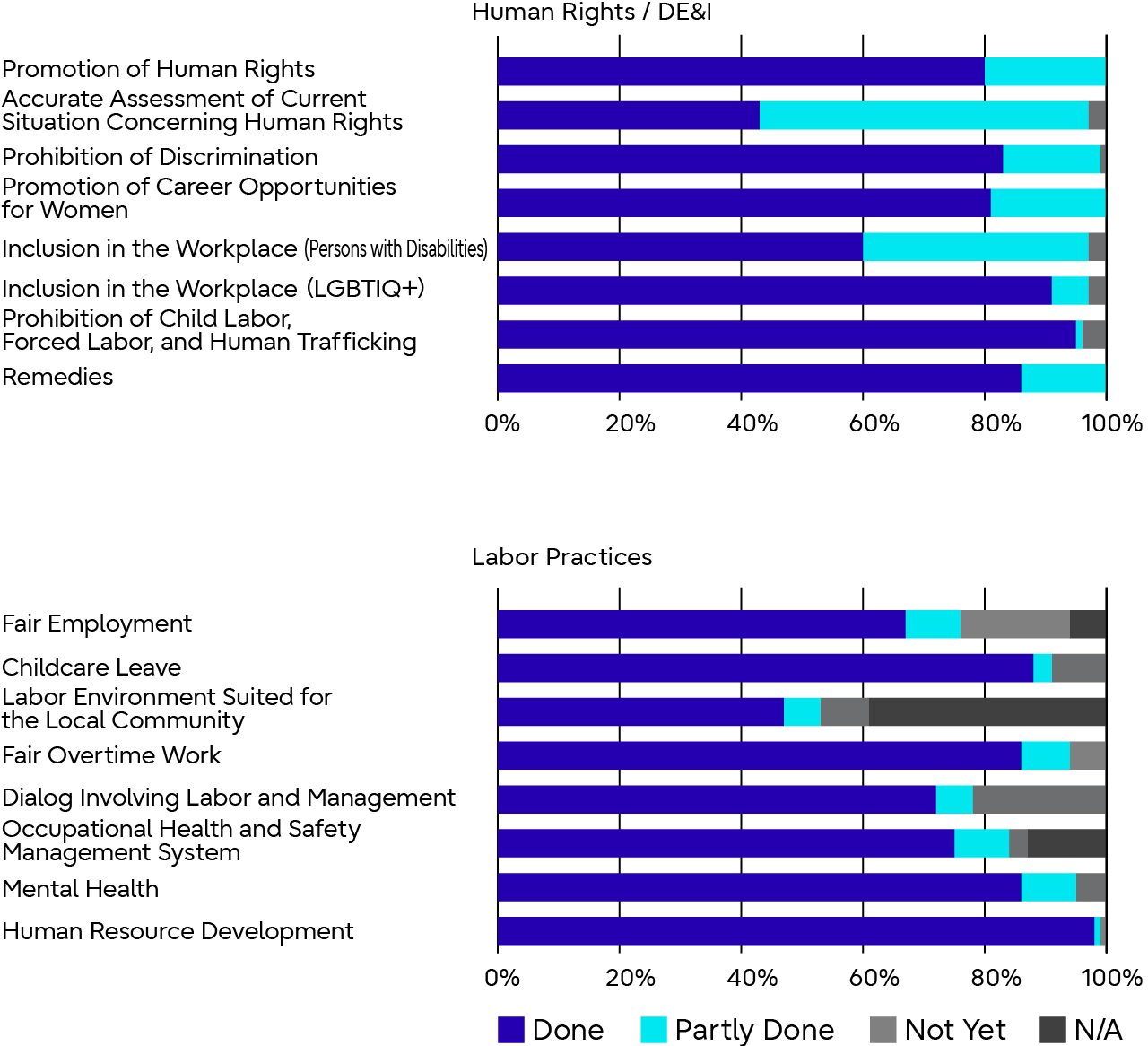
RBA Auditing
The RBA (Responsible Business Alliance) is a CSR alliance composed mainly of global electronics companies. Its purpose is to eliminate human rights abuses and environmental degradation in the global supply chain. Its Code of Conduct is a set of standards for responsible behavior that companies must observe, including respect for human rights.
Since joining the RBA in 2017, the Fujitsu Group has been working both internally and with suppliers to promote responsible business practices and build responsible supply chains, including incorporating the RBA Code of Conduct into the Fujitsu Group Sustainable Procurement Policy.
The RBA Validated Audit Process (VAP) audit is an assessment by third-party auditors to ensure that an employment site is properly operated in accordance with the RBA Code of Conduct. Fujitsu Group's Hobara (Fukushima) and Kasashima (Ishikawa) server and storage manufacturing facilities underwent a VAP audit in FY2023 and FY2025 (May) respectively. Hobara Factory attained Silver Status and Kasashima Factory attained Gold Status, certifying each as having a safe and secure working environment with a high level of respect for the human rights of their workers.
The audit did identify a few exceptions such as “Failure to conduct evacuation drills at sunset” and “Some faulty Emergency lights” (Hobara Factory), and “Inadequate description of the method used for calculating payroll deductions (taxes, social insurance premiums, etc) in the Notification of Conditions of Employment” (Kasashima Factory). However, all have since been rectified and the improvements made currently ensure full compliance with the RBA Code of Conduct.
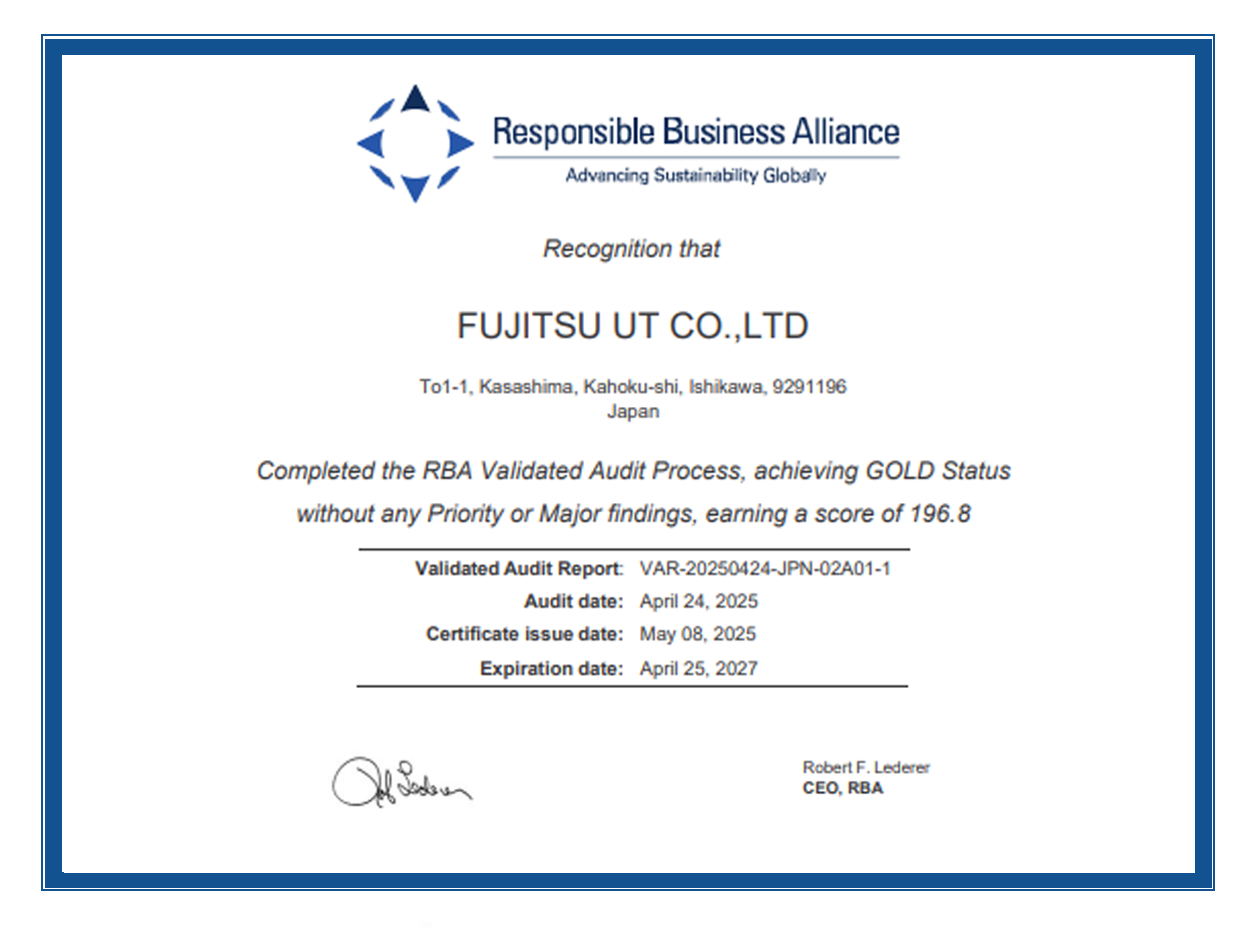
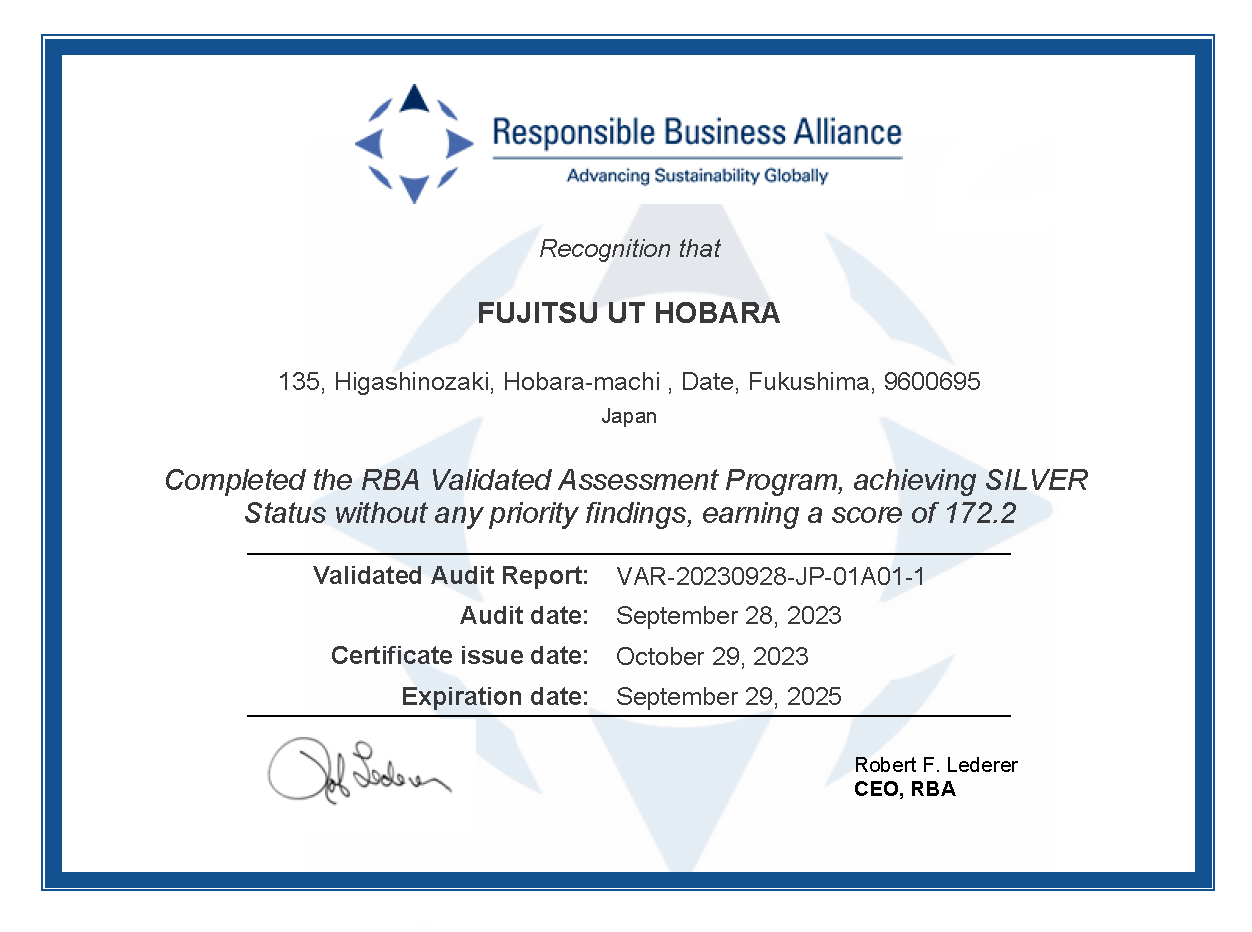
Dialogue with Stakeholders
The Fujitsu Group conducted a discussion with external experts, attended also by relevant internal departments, aimed at addressing the EU Corporate Sustainability Due Diligence Directive (CSDDD).
Framework for Reporting and Consulting on Human Rights Issues
The Fujitsu Group conducts its business activities worldwide in close collaboration with local communities. Working with these communities, we have established systems to engage in human rights-related consultations and information gathering both inside and outside the company, in order to listen to and understand the opinions of various parties and reduce and prevent negative human rights impacts.
Consultation Service for Fujitsu Group employees in Japan: ”Human Rights Consultation Service”
The Fujitsu Group has created an intranet-based system to consult with and accept input from all Fujitsu Group employees on human rights-related issues including harassment. Within Japan, Fujitsu has set up a Human Rights Consultation Service. The matters discussed are reported to the Human Rights Promotion Committee and regularly communicated to auditors, with careful consideration given to ensuring that personal information and privacy are respected. The objectives are to understand the utilization status of this consultation service and to put in place initiatives designed to prevent recurrences of any breaches.
Whistle blowing platform for a wide range of stakeholders ”JaCER Engagement and Remedy Platform Contact Desk”
Since November 2023, the Fujitsu Group has been participating in the Engagement and Remedy Platform, operated and provided by Japan Center for Engagement and Remedy on Business and Human Rights (JaCER), to receive complaints and reports on human rights from a wide range of stakeholders(*3). JaCER aims to provide a non-judicial platform for grievance redress and to act in a professional capacity to support and promote redress of grievances by member companies based on the United Nations Guiding Principles on Business and Human Rights. By accepting complaints through third-party contact points, we aim to promote fairness and transparency in the handling of complaints and promote dialogue and redress more than ever before.
*3: Reports by Fujitsu Group employees regarding illegal activities, illegal transactions, and other non-compliance activities, as well as reports and consultations from Fujitsu Group employees, are accepted through Fujitsu Alert, not this Platform. Consultations on human rights are available at the Human Rights Consultation Service.
Community Human Rights Initiatives
The Fujitsu Group promotes community projects around the globe, aiming to nurture mutual respect and raise awareness of human rights through interaction and collaboration with various people.


